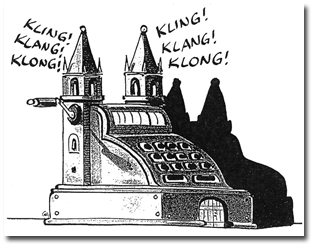
After the Napoleonic Wars, church properties were confiscated by the German state, the Catholic Church in Germany received in recompense the Church Tax. All Catholics who are officially registered with the state as Catholics must pay a small percentage of their income as the Church Tax, Kirchensteuer. Post-war prosperity swelled the coffers of the Church ( a tax of $11 Billion in 2010) and enabled it to construct an immense bureaucracy. When Ratzinger went to the Vatican he marveled that it has fewer employees than the archdiocese of Munich.
There is only one way not to pay the tax. Catholics can go to a state office and declare that they are no longer members of the Catholic Church and therefore are not subject to the Church tax. Many did this during the 1930s under Nazi pressure. Recently the numbers of those leaving the Church have swelled. Some have lost faith, others don’t want to pay the tax, others are unhappy because of the sexual abuse scandals in Germany.
Fewer Catholics paying Church tax = less money = CRISIS.
Frankfurter Allgemeine Zeitung reports that the German bishops have taken a strong stand.
Anyone who wants to go off the official government roles as a tax paying Catholic must go before a representative of the Church who will explain to him that if he stops paying Church tax he will
- Not be able to receive the sacraments
- Cannot serve as a godparent
- Cannot be a member of a Catholic organization
- May be fired if he works in apposition which requires an official mission from the Church (i.e., teacher of religion
- May be denied Catholic funeral rites and burial.
Some Germans claimed when could fulfill the obligation to support the Church financially without paying the Church tax, but Benedict XVI and Cardinal Gerhard Müller, the head of the Congregation for the Doctrine of the Faith, have approved the German bishops’ decree and given it the force of canon law.